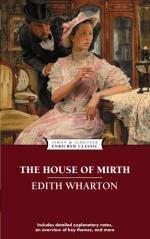|
This section contains 7,877 words (approx. 27 pages at 300 words per page) |

|
SOURCE: Orr, Elaine N. “Contractual Law, Relational Whisper: A Reading of Edith Wharton's The House of Mirth.” Modern Language Quarterly 52, no. 1 (March 1991): 53-70.
In the following essay, Orr discusses the world of The House of Mirth as a contractual milieu.
“But you belittle me, don't you, … in being so sure.”
—Lily Bart1
“Must the multiple nature of female desire and language be understood as the fragmentary, scattered remains of a raped or denied sexuality? This is not an easy question to answer.”
—Luce Irigaray2
While most critics agree that Edith Wharton's The House of Mirth is a novel about negotiation, about bargaining and compromise, interest and disinterest, exchange and profit, few have commented upon this thematics except as a thoroughly negative one, reflecting the author's political “bleakness of vision” in regard to “a totalizing system” (the marketplace) from which there is no escape.3 Indeed, Wai-Chee Dimock argues that...
|
This section contains 7,877 words (approx. 27 pages at 300 words per page) |

|


